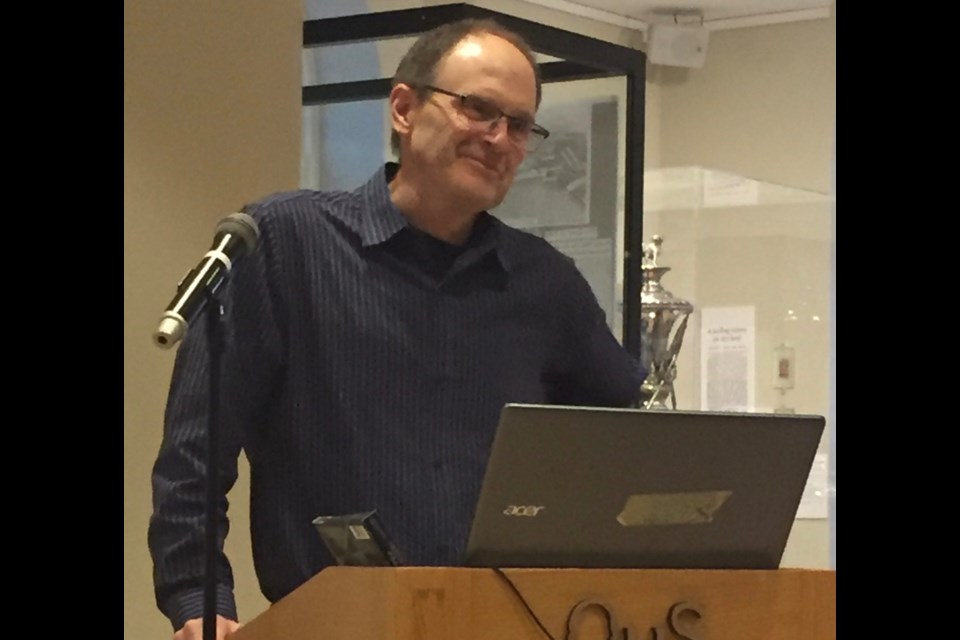ORILLIA MUSEUM OF ART & HISTORY
********************
Dr. Chris Decker presented a comprehensively researched account, enriched by video interviews and recorded musical excerpts, opening up the world of “Glenn Gould: His Life, His Cottage, His Orillia” recently at the Orillia Museum of Art & History (OMAH) Speaker Series, much to the enjoyment of an engaged audience.
According to Decker, images of 1930s Orillia are of a community that was “dry, unquestionably Conservative and isolated culturally.” Although Gould never performed at The Opera House, he was eventually named to the Orillia Hall of Fame, after prolonged council debate.
When the Gould family purchased a lot on Lake Simcoe near Uptergrove in 1935, locals could not have predicted the international standing that Glenn Gould’s virtuosity would achieve during his brief 50 years of life (1932 - 1982).
The Gould family bought Lot 26, Concession Nine, on MacDonald Beach. Signage on Highway 12 now commemorates Gould. Duncan MacDonald helped to build the Gould cottage, assisted by Bill Doolittle.
A Chickering piano, built by the first piano manufacturer in America from 1823, out of Boston, and favoured by Jenny Lind, was moved to the cottage. Attendee Frank Milligan, whose family had a cottage nearby, attested to hearing Gould playing piano at all hours.
Glenn Gould’s giftedness was evident from early childhood. With his mother as tutor, he read music at age 3, before he could read words, and passed the Conservatory exams at age 12.
By 1950, at the age of 18, he had made his debut on CBC. In the late 1950s he toured the Soviet Union, Germany and Austria. In the 1960s, he played New York City with Igor Stravinsky and Leonard Bernstein.
Gould’s photographic memory meant that he rarely practiced, having memorized the score. As the years went on, he became averse to live performance. He thought it hedonistic showmanship.
He did many interviews, but saw audiences as a ‘force of evil,’ ‘chilling,’ and as exemplifying a ‘rule of mob love.’
Gould loved technology, finding that recording let him in on the composing secrets of a work, revealing performance options and a sense of how the architecture of the piece should be projected in performance.
When at the cottage as an adult, Gould loved fishing and walking with his dog and dining at the Shangri-La Gardens restaurant (now Brewery Bay). Always welcomed by owner Jin Seto, Gould never ate Chinese food and always wore white gloves when he ate. His favoured dining selection was steak, mashed potatoes, six buns with butter, and a cream pie.
Glenn Herbert Gould died after a severe stroke on Oct. 4, 1982. Three thousand people attended his funeral. He is buried at Mount Pleasant Cemetery in Toronto.
Others in the audience told stories of encounters and interactions with Glenn Gould in Orillia. Dr. Decker captivated the audience with the story of the life of Glenn Gould and his abiding passion for Uptergrove and Orillia.
The OMAH History Speakers Evening will take a break for the summer. Mark your calendars for the following talks:
October 16 - Orillia Secondary School student’s: From Ortona to Juno – A Journey of Remembrance
November 20 – Fred Kallin: Raoul Wallenberg – Legendary Hero
January 15 – Dr. Harry Hall: My Life as a Doctor in Orillia and Area
We are busy finalizing a list of dynamic speakers and topics for the History Speaker Series and exciting guest speakers for the Annual Carmichael Art History Lecture for 2020. Stay tuned for more details!
The Committee thanks you for your overwhelming support this year.
********************
